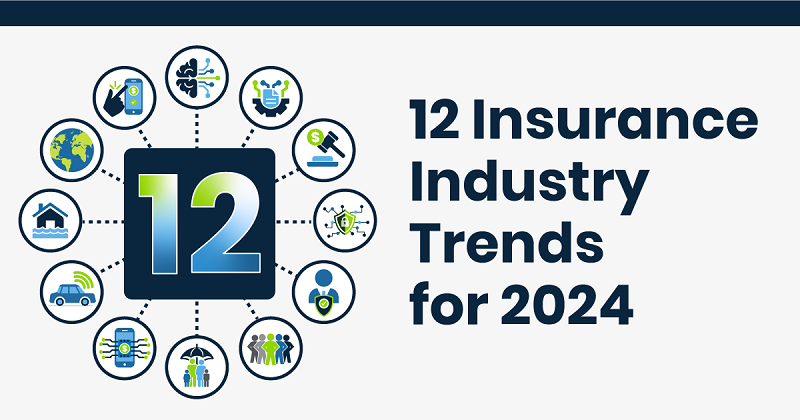The Future of Insurance: Key Trends and Predictions for 2024
The insurance industry is on the brink of a major transformation. As we move into 2024, the future of insurance is being shaped by rapid technological advancements, changing consumer expectations, and evolving regulatory landscapes. In this article, we will explore the key trends and predictions that are set to redefine the future of insurance.

Embracing Digital Transformation
Digital transformation is at the heart of the future of insurance. Insurers are increasingly adopting advanced technologies to streamline operations, enhance customer experiences, and improve risk management. The integration of artificial intelligence (AI), machine learning (ML), and blockchain technology is revolutionizing the industry.
Artificial Intelligence and Machine Learning: AI and ML are enabling insurers to process large volumes of data quickly and accurately. These technologies are used for predictive analytics, fraud detection, underwriting, and personalized customer service. By leveraging AI and ML, insurers can offer tailored policies, faster claims processing, and proactive risk mitigation.
Blockchain Technology: Blockchain is transforming the way insurers handle contracts and transactions. It offers enhanced security, transparency, and efficiency. Smart contracts, powered by blockchain, automate claims processing and reduce administrative costs. This technology ensures trust and reduces the potential for fraud in the insurance ecosystem.
Rise of Insurtech Startups
The future of insurance is being significantly influenced by insurtech startups. These innovative companies are leveraging technology to disrupt traditional insurance models. Insurtech startups are focusing on customer-centric solutions, simplifying the insurance buying process, and offering personalized coverage options.
On-Demand Insurance: On-demand insurance is gaining popularity among consumers who seek flexibility and convenience. Insurtech companies are providing coverage for specific events or time periods, allowing customers to purchase insurance only when needed. This trend is particularly evident in travel, rental, and gig economy insurance.
Peer-to-Peer Insurance: Peer-to-peer (P2P) insurance models are gaining traction as they foster a sense of community and trust among policyholders. In P2P insurance, a group of individuals pools their premiums to cover each other's claims. This approach reduces costs and promotes transparency, making insurance more affordable and accessible.
Personalization and Customer Experience
In the future of insurance, personalization and customer experience will be paramount. Insurers are shifting from a product-centric approach to a customer-centric one, focusing on individual needs and preferences.
Behavioral Data and Telematics: Insurers are using behavioral data and telematics to offer personalized policies. For example, in auto insurance, telematics devices track driving behavior, allowing insurers to provide usage-based insurance (UBI) and rewards for safe driving. This not only benefits customers with lower premiums but also promotes safer driving habits.
Digital Platforms and Mobile Apps: Digital platforms and mobile apps are transforming how customers interact with insurers. These platforms offer seamless access to policy information, claims filing, and customer support. Insurers are investing in user-friendly interfaces and chatbots to provide instant assistance, improving overall customer satisfaction.
Regulatory Changes and Compliance
The insurance industry is subject to evolving regulatory requirements, and staying compliant is crucial for the future of insurance. Regulatory changes aim to protect consumers, ensure fair practices, and address emerging risks.
Data Privacy and Cybersecurity: With the increasing use of digital technologies, data privacy and cybersecurity have become top priorities. Insurers must comply with stringent data protection regulations, such as the General Data Protection Regulation (GDPR) and the California Consumer Privacy Act (CCPA). Implementing robust cybersecurity measures is essential to safeguard sensitive customer information.
Climate Change and ESG Reporting: Climate change is posing significant challenges to the insurance industry. Insurers are required to assess and disclose climate-related risks in their portfolios. Environmental, Social, and Governance (ESG) reporting is becoming a standard practice, driving insurers to adopt sustainable and socially responsible practices.
Innovative Insurance Products
The future of insurance will see the emergence of innovative products that cater to evolving customer needs and address new risks.
Cyber Insurance: As cyber threats continue to rise, the demand for cyber insurance is growing. Cyber insurance policies provide coverage against data breaches, ransomware attacks, and other cyber incidents. Insurers are developing comprehensive solutions to help businesses mitigate cyber risks and recover from potential losses.
Parametric Insurance: Parametric insurance is gaining traction as a flexible and efficient solution for covering specific events. Unlike traditional insurance, parametric insurance pays out a predetermined amount based on the occurrence of a predefined event, such as a natural disaster. This approach ensures quick and transparent claims settlement.
Collaboration and Partnerships
Collaboration and partnerships are key to driving innovation and growth in the future of insurance. Insurers are teaming up with technology companies, reinsurers, and other stakeholders to enhance their offerings and expand their reach.
Ecosystem Partnerships: Insurers are forming ecosystem partnerships to provide holistic solutions to customers. For example, partnerships with health tech companies enable insurers to offer wellness programs and preventive care services. These collaborations create value-added services that go beyond traditional insurance coverage.
Open Insurance and APIs: Open insurance is an emerging trend that promotes data sharing and collaboration through Application Programming Interfaces (APIs). By sharing data with third-party providers, insurers can offer innovative services and products. Open insurance fosters a competitive and customer-centric market, benefiting both insurers and policyholders.
Conclusion
The future of insurance is characterized by digital transformation, customer-centricity, regulatory compliance, and innovative solutions. As insurers embrace advanced technologies and adapt to changing consumer needs, they are poised to navigate the evolving landscape successfully. By staying ahead of the trends and predictions, the insurance industry can continue to provide value, security, and peace of mind to customers in 2024 and beyond.